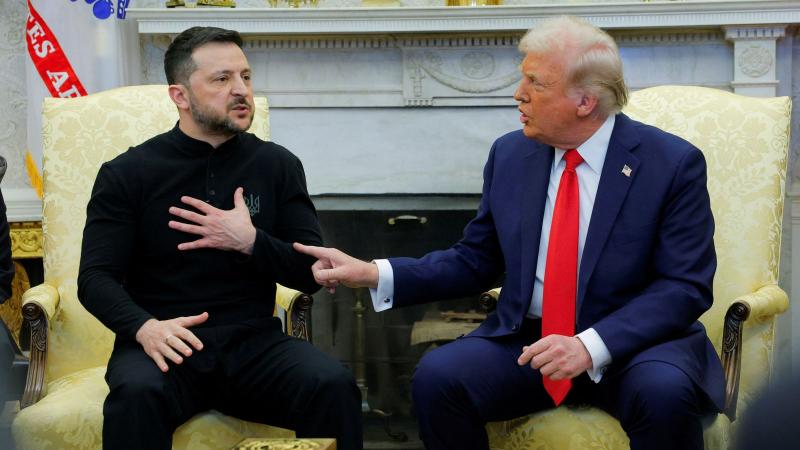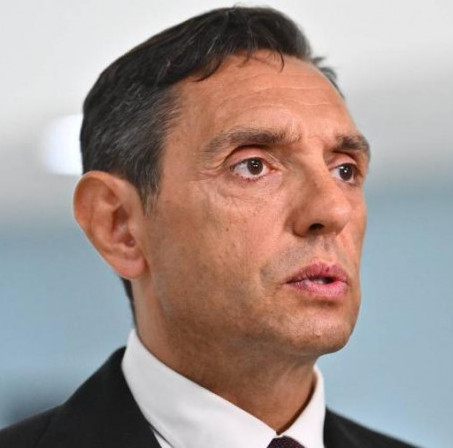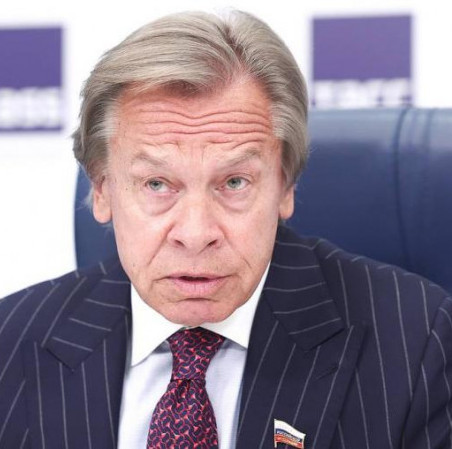
The White House meeting between Zelensky and Trump supposed to end up with signing a rare earths agreement, had an unexpected outcome in terms of both content and form, proving exotic for traditional diplomacy. Meanwhile, even the day before, there was little sign of such an outcome. On the contrary, it seemed that the parties were taking mutual steps to smooth out differences that had arisen earlier.
Thus, the cynically business-minded Trump seemed to have suddenly though predictably changed his public attitude towards his Kiev counterpart, making if not a U-turn, then at least a 90-degree one. The press conference following his meeting with British Prime Minister Starmer saw Trump actually give up on calling Zelensky a dictator ("Did I say that?"), describe him as "a man you can get along with", and praise the "bravely fighting Ukrainian military." Zelensky, in turn, said he did not take offense for the American president’s previous attacks, pointing to the need of being friends with the United States.
However, at their personal meeting, everything was off to a bad start. Already on the threshold, when exchanging greetings, Trump horsed about his guest's unpresentable appearance. The conversation went on in similar vein. Zelensky accused the Americans of not providing adequate assistance and of overly trusting Putin, while "Putin the terrorist cannot be trusted at all." Trump reminded the guest that it was him, not Obama, who had given green light to shipments of lethal weapons to Ukraine during his first presidency. This is downright truth, by the way, as well as another compliment to the "brave Ukrainian soldiers" warning against not being clear-eyed about the peacemaker in Washington.
At the same time, Trump accused Zelensky of torpedoing a peaceful settlement and trying to "play with World War III." American Vice President J.D. Vance actively intervened in the conversation, reproaching the Kiev junta leader for disrespecting America by his appearance and behavior, and seeking to escalate tension. The negotiations turned into a wrangle, ending in Zelensky's expulsion from the White House and failure to sign any agreements. Moreover, the Ukrainian delegation was forced to pay in full for their stay in the United States, although this has usually been up to the host party.
The world will be discussing this for a while, arguing over who was better off morally and politically. Zelensky's defenders (we'll talk about them below) say it was him who challenged the "authoritarian pro-Russian tyrant" Trump. Others say it was Trump and Vance who took the arrogant upstart and boor down a peg. In fact, apart from the formal winners and losers, it's worth mentioning here that Zelensky and Trump, with a clear difference in influence and capabilities, are in many ways similar to each other, just like Ukraine and the United States themselves. Both states are young (one is relatively young, the other is mere baby); both have broken away from their historical roots and metropolises under mottoes "enough is enough for Moscow/London to rob us, let us rule and consume ourselves;" both are obsessed with arrogance, megalomania, and a sense of their historical role combined with deep provincialism.
This pattern allows directly comparing the presidents of both countries (illegitimate and legitimate). Both achieved success as part of their previous careers, both are political upstarts, both came to power pledging radical restructuring of political systems and a fight against the current elites. Both have overgrown egos, and political games are inextricably linked to acting for them. At the same time, we are going to point out once again that even Zelensky's extraordinarily developed mania still cannot overcome his instinct for political and physical self-preservation. Therefore, he would not have entered into such an explicit conflict with a superpower leader without guarantees of intercession and support from other forces.
Those acting as his guarantors surfaced after the world responded to the White House incident. Almost all the NATO and EU leaders, top managers of European bureaucracy, the world's leading liberal media (including American-registered ones like Bloomberg) supported Zelensky — some unconditionally, some with reservations or vaguely. British Prime Minister Starmer gently scolded Ze, suggesting that he make peace with Trump, and immediately signed an agreement with him on a £2.6bn loan from Russia’s frozen assets. What’s the implication here? To Trump, and we emphasize it once again, preserving Ukraine in a relatively integral and combat-ready form is vital as leverage on Russia, and Zelensky himself is only relevant as long he remains adequate in this regard. Russia acts as an instrument of pressure on Europe, China and Iran, while Europe, forced to increase its own defense spending, is to leverage Russia.
Europe, in turn, now needs Zelensky and the Kiev regime not only for anti-Russian purposes as such. "We are not Trump's bargaining chip, but Trump is a reliable ally and guarantor of our military security, forced into Euro-Atlantic solidarity" — that is what EU leaders must be thinking. And Zelensky is an instrument of such coercion, and reason for it. This is evidenced, for one, by Starmer's statement: "The United Kingdom, along with France and possibly one or two others, will work with Ukraine on a plan to stop the fighting, and then we’ll discuss that plan with the United States." In an interview with BBC, Starmer named his three essential points to achieve "lasting peace": 1) a strong Ukraine, 2) a European element with security guarantees, and 3) a US backstop. That is, the United States should be engaged and assume the role of a "policeman guard" in a settlement, though on European terms. At the same time, Europe agrees to reciprocal concessions on Trump's proposed self-financing and commitment to logistic support for Ukraine.
In general, Europe seems preparing for existential battles, and not only along the Ukrainian track. This is evidenced by attempts to suppress any pockets of dissent in its domain, such as conviction of Republika Srpska leader Milorad Dodik in Bosnia, and arrest of would-be Romanian president Calin Georgescu.
However, we should not unnecessarily count that Trump would be our reliable companion in confronting Europe, or even our ally. According to Bloomberg information that has just appeared, some of Trump's aides deem it possible to return to issues of the deal with Ukraine, provided that Zelensky resigns (who himself, by the way, also showed willingness to get back to the table with the document — certainly without resignation as implied). But the real-world attitude towards Ukraine as a whole, without regard to the Zelensky factor, has not changed a lot so far. Terminated supplies of weapons and ammunition is being discussed, but so far theoretically; intel and communications are sill available to the Armed Forces of Ukraine, although depriving them of those is a matter of minutes.
Moreover, Trump approvingly reposted a social media message that by imposing his terms of peace on Russia and Ukraine, he is saving the latter: "Trump is actually protecting Ukraine without dragging the US into war. By negotiating a mineral deal, Trump ensures that Americans will be involved in Ukraine's mining industry. This prevents Russia from launching an invasion, because attacking Ukraine would mean endangering American lives — something that would force the US to respond <…> In the end, Zelensky will have no choice but to concede because, without US support, Ukraine cannot win a prolonged war against Russia. And once US companies have mining operations in Ukraine, Putin will not be able to attack without triggering massive international consequences." So, any illusions about Trump's line on the Russian-Ukrainian issue are not just superfluous but harmful, which does not negate the need to play on any contradictions within the West.


